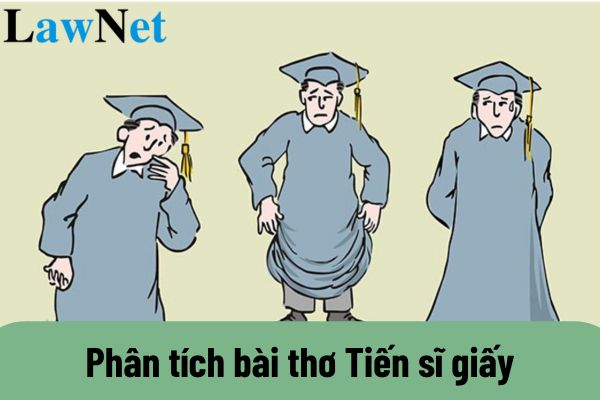Vietnam: What are the guidelines for analysis of the poem "Tiến sĩ giấy"? What is the regulatory age of students entering lower secondary education?
What are the guidelines for analysis of the poem "Tiến sĩ giấy"?
Analyzing the poem "Tiến sĩ giấy" involves understanding, exploring, and elucidating the meanings, artistry, as well as messages that the author intends to convey through this work. The analysis helps us gain deeper insight into the piece, the society, and the people during the period the work was created, and it also aids in developing our literary appreciation skills.
8th-grade students may refer to the following analysis of the poem "Tiến sĩ giấy":
|
Analysis of the poem "Tiến sĩ giấy" The poem "Tiến sĩ giấy" by the author Nguyen Khuyen is a profound critique of the phenomenon of "paper doctorates" in feudal society, where titular degrees do not accurately reflect a person's talent and moral virtue. This poem not only mocks those who are greedy for titles but also exposes the satire on a social system where titles could be easily purchased without real knowledge. |
*Note: The above analysis of the poem "Tiến sĩ giấy" is for reference only./.

What are the guidelines for analysis of the poem "Tiến sĩ giấy"? What is the age of students entering lower secondary education in Vietnam? (Image from the Internet)
What is the age of students entering lower secondary education in Vietnam?
Under Article 28 of the Education Law 2019:
Educational levels and entry ages
1. Educational levels and age groups of general education are regulated as follows:
a) Primary education lasts for 05 school years, from the first to the fifth grade. The entry age for the first grade is 06;
b) Lower secondary education lasts for 04 school years, from the sixth to the ninth grade. Students must complete the primary educational programme before entering the sixth grade. The entry age for the sixth grade is 11;
c) Upper secondary education lasts for 03 school years, from the tenth to the twelfth grade. Students must complete the lower secondary educational programme before entering the tenth grade. The entry age for the tenth grade is 15;
2. Cases where schooling could be commenced at younger ages or at higher ages prescribed in clause 1 of this Article are as follows:
a) Commencing schooling at younger ages for students with early intellectual development;
...
Lower secondary education lasts for 04 school years, from the sixth to the ninth grade. Students must complete the primary educational programme before entering the sixth grade. The entry age for the sixth grade is 11.
Thus, the age of students entering lower secondary education in Vietnam is 11.
*Note: This does not apply to cases where students skip a grade or study at an older age.
What are the 07 prohibited acts for lower secondary school students in Vietnam?
Under Article 37 of the charter of lower secondary schools, upper secondary schools, and multiple-level schools issued with Circular 32/2020/TT-BGDDT, the 07 prohibited acts for lower secondary school students in Vietnam include:
1. Disrespect the dignity, honor or bodily integrity of teachers, officials and staff of their schools, other people and other students.
2. Act dishonestly in learning, examinations or admission process.
3. Buy, sell or use alcohol, tobacco, drugs, other stimulants, firecrackers or explosives.
4. Use mobile phones and other devices in class for purposes other than learning and without the teacher's permission.
5. Fight or disrupt public or school order or security.
6. Use or exchange cultural products that incite violence or contain indecent materials; use toys or play games that impede their own healthy development.
7. Students shall not commit other prohibited acts provided for by regulations of law.
Thus, above are the 07 prohibited acts for lower secondary school students in Vietnam.

